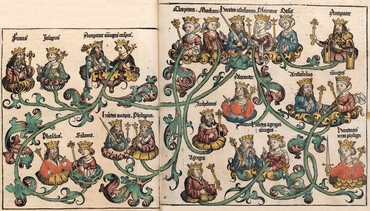1
Dette er Navnene på Israels Sønner, der sammen med Jakob kom til Ægypten med deres Familier:
3
Issakar, Zebulon og Benjamin,
4
Dan og Naftali, Gad og Aser.
5
Jakobs Efterkommere udgjorde i alt halvfjerdsindstyve, men Josef var i Ægypten.
6
Imidlertid døde Josef og alle hans Brødre og hele dette Slægtled.
7
Men Israeliterne var frugtbare og formerede sig, og de blev mange og overmåde talrige, så at Landet blev fuldt af dem.
8
Da kom der en ny Konge over Ægypten, som ikke vidste noget om Josef;
9
og han sagde til sit Folk: "Se, Israels Folk bliver talrigere og stærkere end vi.
10
Velan, lad os gå klogt til Værks imod dem, for at de ikke skal blive for mange; ellers kan det hænde, når vi kommer i Krig, at de går over til vore Modstandere og kæmper mod os og til sidst forlader Landet!"
11
Så satte man Fogeder over dem til at plage dem med Trællearbejde, og de måtte bygge Forrådsbyer for Farao: Pitom og
a'amses.
12
Men jo mere man plagede dem, des flere blev de, og des mere bredte de sig, så Ægypterne fik
ædsel for Israeliterne.
13
Og Ægypterne tvang Israeliterne til Trællearbejde
14
og gjorde dem Livet bittert ved hårdt Arbejde med Ler og Tegl og alle Hånde Markarbejde, ved alt det Arbejde, de tvang dem til at udføre for sig.
15
Ægypterkongen sagde da til Hebræerkvindernes Jordemødre, af hvilke den ene hed Sjifra, den anden Pua:
16
"Når I forløser Hebræerkvinderne, skal I se godt efter ved Fødselen, og er det et Drengebarn, tag så Livet af det, men er det et Pigebarn, lad det så leve!"
17
Men Jordemødrene frygtede Gud og gjorde ikke, som Ægypterkongen havde befalet dem, men lod Drengebørnene leve.
18
Da lod Ægypterkongen Jordemødrene kalde og sagde til dem: "Hvorfor har I båret eder således ad og ladet Drengebørnene leve?"
19
Men Jordemødrene svarede Farao: "Hebræerkvinderne er ikke som de Ægyptiske Kvinder, de har let ved at føde; inden Jordemoderen kommer til dem, har de allerede født!"
20
Og Gud gjorde vel imod Jordemødrene, og Folket blev stort og såre talrigt;
21
og Gud gav Jordemødrene Afkom, fordi de frygtede ham.
22
Da udstedte Farao den Befaling til hele sit Folk: "Alle Drengebørn, der fødes, skal I kaste i Nilen, men Pigebørnene skal I lade leve!"







